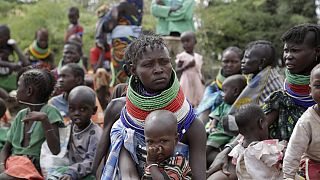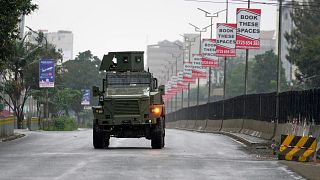Kenya
In less than 3 weeks, Kenyans will be heading back to the polls to vote for their next president and leaders - and the economy appears to be taking centre stage.
Thousands of Kenyan have been taking to the streets calling for a boycott of the elections because of the high cost of living.
The rise in prices because of the war in Ukraine coupled by 2 years of COVID has meant that according to the Kenya National Bureau of Statistics the country's year-on-year inflation rate has hit 7.9%.
The World Bank projects that oil and gas prices will increase by 81% in 2022 driving prices higher and beyond the reach of many Kenyans.
The price of Kenya's maize flour - a staple in Kenyan homes - went up from Sh150(1.5 USD) to Sh200 (2 USD) between May and June 2022-an over 30% percent increase in less than 2 weeks.
Making matters worse for Kenya has been a regional drought and absence of rains leading to food shortages.
For the first time in Kenya's political history leaders appear to have noticed that voters are angry and they have been shifting campaign politics away from personality and ethnic politics to economic development and growth.
Presidential candidates have been making wild promises and assertions to Kenya's poor by tackling endemic corruption, a rising public debt and providing vulnerable families with stipends or credit and loans without explaining how.
One of the protesters, 68 year-old Beatrice Atieno, a mother of 2 daughters and grandmother to 12 children, pleaded for the price of flour to be reduced so she could cook ugali, Kenya's staple food.
"I don't recognise my country anymore. Is this really our country? We are not refugees, we are Kenyans. Please treat us as Kenyans," she said.
Like hundreds of other protesters carrying banners calling themselves the"Movement of the Hungry People" and the "Hunger Revolution," Atieno waves an empty plate demanding food prices come down.
In the impoverished neighbourhood of Mathare where Atieno lives, previous elections were marred with political violence. Here, Atieno cares for 12 grandchildren while her 2 daughters go out looking for odd jobs.
Putting food in her grandchildren's bellies every day is proving more and more challenging. She's lucky if she can feed them once a day.
"If we cannot afford food then many of us will not be able to go and vote. Many people will just sleep in their house because we won't have the energy to walk or to come out of our houses to go stand in the long lines," she said.
The Kenyan electoral commission (IEBC or Independent Electoral and Boundaries Commission)early voter figures show that voter registration among people under the age of 35 has been dropping, citing voter apathy, especially among the youth.
"The average Kenyan is very politically aware, very politically engaged, and we achieve high voter turnouts with almost every general election. So when you have a voter registration process in which the IEBC falls below its target, that's new, that's a bit of a concern, to be honest," said Tom Mboya, a governance consultant and Kenyan political expert.
He said many were dissatisfied with the current state of Kenyan politics.
"I don't think there is only one single factor that is driving the voter apathy but possibly a perfect storm, you know, a combination of factors that creates a number of difficulties in people's lives which they are currently dealing with."
On 9 August, 22 million Kenyans are eligible to vote, many of them live below the poverty line and so the price of staple foods and fuel will play a major part in the election.











00:22
Boniface Kariuki, a Kenyan mask vendor shot at close range laid to rest
00:37
UN Human Rights Office says 'deeply troubled' by Kenya protester deaths
01:42
Kenya: at least 10 dead in ongoing protests, 29 injured nationwide
00:28
Nairobi hawker shot at close range by police declared brain dead
Go to video
Kenya's Interior minister accuses protesters of coup attempt after deadly demos
01:07
Kenya prepares for first anniversary of Finance Bill protests